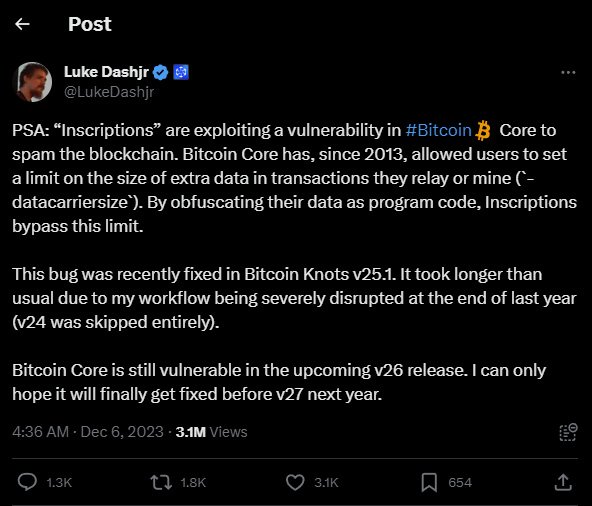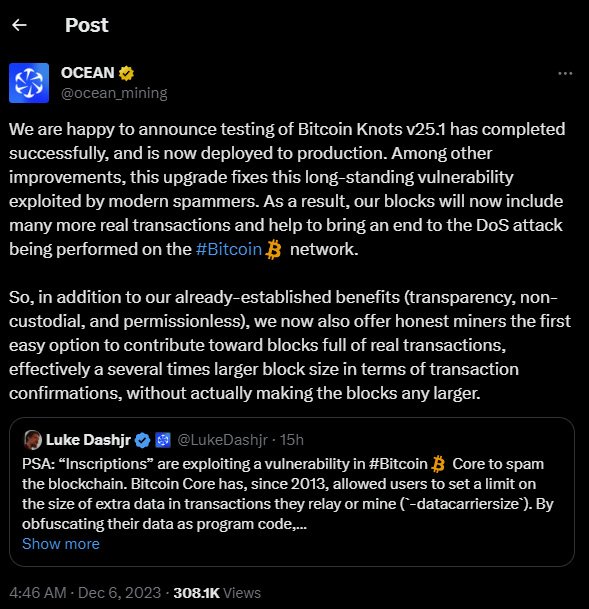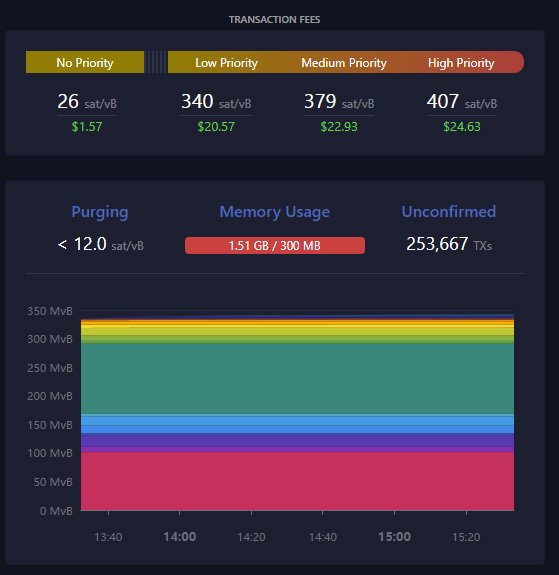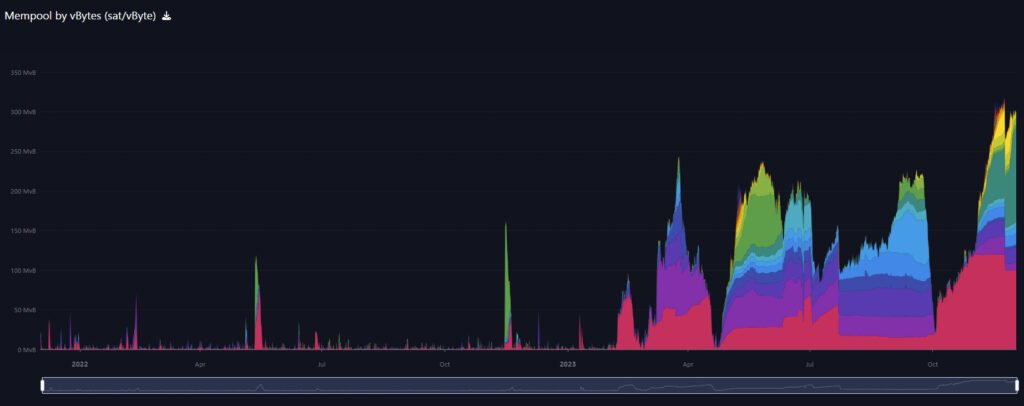Bitcoin Core Developer Luke Dashjr has proposed a significant fix aimed at mitigating network congestion caused by Bitcoin Ordinals BRC-20 tokens.
What Are Bitcoin Ordinals?
Bitcoin Ordinals are basically non-fungible tokens (NFTs) on the Bitcoin blockchain, utilizing satoshis as the base unit. Each satoshi is assigned a unique serial number called an ordinal, aiding in tracking ownership and location.
The Ordinal protocol allows for additional content, like images or text, to be attached to satoshis through a process called inscribing. This enables the storing of NFTs directly on the Bitcoin blockchain, benefiting the security and decentralization features of Bitcoin. The software for Bitcoin mainnet Ordinals was released in January 2023.
Understanding the Issue
The problem at hand, revolves around Ordinals and BRC-20 tokens, which have been identified as culprits in causing excessive network congestion. This has caused the topic of Ordinals inscriptions to become the center of many hot debates lately. These tokens are utilizing a recently added feature within the Bitcoin Core code, allowing users to surpass set limits on the size of additional data in transactions.
Many, including Luke Dashjr, believe Ordinals are “exploiting a vulnerability” in Bitcoin Taproot update. The update was meant to make Lightning Network channels creation lighter and smaller. Ordinals now use this update to attach unrelated data to Bitcoin transactions, uploading images and texts directly to the Bitcoin blockchain.
As a result, users have been able to upload data onto the Bitcoin blockchain that are significantly larger than standard bitcoin transactions. This is an attempt to mint NFTs on the Bitcoin blockchain. This trend has caused an influx of transactions —considered spam by many bitcoiners— to overwhelm the blockchain, impacting the network’s efficiency, raising transaction fees and causing concerns within the community.
In other words, these actions would cause large NFT transactions to clog up the mempool, effectively forcing users to pay exorbitantly higher fees to get their regular bitcoin transactions confirmed.
A Controversial Topic
Many Ordinals advocates, on the other hand, believe the Bitcoin Network is for everyone to use, as long as users follow its rules. So according to this perspective, individuals can freely utilize blockspace as much as they desire, as long as they pay the required fees.
They believe that since Bitcoin is an open network, no one gets to dictate what gets uploaded onto the blockchain. As long as every transaction meets the criteria and follows the rules, then it shouldn’t matter what it contains or what it is meant to do.
Related reading: Is The Bitcoin Network Under Attack?
Luke Dashjr’s Initiative
Luke Dashjr, a prominent figure in Bitcoin Core development, has been vocal about addressing the recent events. He stated that inscriptions used by Ordinals and BRC-20 creators can manipulate the system by disguising their data as program code, effectively bypassing the size limit restriction. Dashjr aims to close what he sees as a vulnerability to prevent further “exploitation” by these tokens.
Related reading: Bitcoin Developers Community In Heated Debates Over Ordinals

He mentioned the works are already underway to fix this issue, but it is still present in version 26, stating:
“Bitcoin Core is still vulnerable in the upcoming v26 release. I can only hope it will finally get fixed before v27 next year.”
The Proposed Solution
The proposed “bug fix”, which has been implemented in the latest update to Bitcoin Knots—a derivative of Bitcoin Core—aims to settle this long-standing matter. If successfully implemented in Bitcoin Core, it would prevent the creation of new NFTs and BRC-20 tokens, ultimately alleviating the issue of network congestion caused by these tokens.
A Mining Pool Taking Initiative
The recently launched decentralized mining pool Ocean, has taken the lead on the matter. In an announcement, it stated that it is utilizing the Bitcoin Knots implementation, effectively ignoring the Ordinals transaction.

Many NFT advocates consider this an act of “censorship“, and believe this opposes the Bitcoin’s ethos as a free-to-use network for everybody.
Dashjr’s Assertions and Statements Ignited Discussions
While this fix could address the pressing network congestion issue, it could also have ramifications for the growth of the Ordinals and BRC-20 ecosystems. Dashjr confirmed this, stating that once the vulnerability is resolved, these tokens would no longer be viable for creation. However, existing inscriptions would remain intact.
Dashjr’s stance against Ordinals and inscriptions has divided opinions within the Bitcoin community. He believes the Ordinals lack legitimacy, stating that this recent trend has been an “attack” on the Bitcoin network from the start. He also dismissed the “Inscriptions will be priced out” narrative as “dumb”, stating that adhering to such narratives will be damaging to Bitcoin and its users.
Some argued that these efforts might not gain support from miners, as miners are looking to make money. So they will mine the transactions that pay the most fees, regardless of their intent or type. Dashjr remained steadfast in this matter, asserting that these tokens and inscriptions were never authorized and have been detrimental to Bitcoin and its users.
Nevertheless, Dashjr is unwavering in his stance, asserting that NFTs within the Bitcoin network were essentially non-existent from the beginning and “never existed”, branding them as “fraud.”
The Impact on the Bitcoin Network
The surge in Ordinals inscriptions and BRC-20 token minting has led to heightened congestion within the Bitcoin network. Reports indicate over 220,000 unconfirmed transactions, significantly impacting transaction costs, which have surged from around $1.50 to as high as $25.

According to mempool.space, The introduction of the Ordinals protocol by Casey Rodarmor in January 2023 has caused significant rise in mempool congestion. This has stirred debate within the Bitcoin community.
While some believe it could attract more users and expand Bitcoin’s use cases, purists argue that it could deter genuine financial activity, tarnishing Bitcoin’s image as a reliable peer-to-peer payments network.

The Future of Ordinals on the Bitcoin Blockchain
Dashjr’s proposed fix stands as a crucial step toward addressing the ongoing network congestion caused by Ordinals. However, it has raised heated debate among supporters and opponents alike. The resolution poses potential challenges to the growth of this specific ecosystems while sparking debates within the Bitcoin community about the protocol’s impact on network sustainability and innovation.
Read more on the subject:










